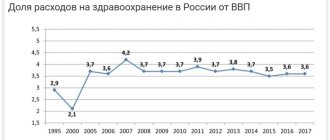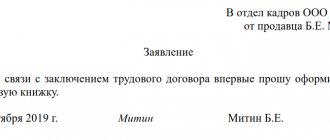Home / Family law / Children's rights
Back
Published: 08/15/2018
Reading time: 8 min
0
464
The Family Code of the Russian Federation regulates relationships between members of the same family, including marriage and raising children, as well as property relations of relatives. A child always has the right to life, education, upbringing, and property. Children have the right to freely express their opinions, choose religion and lifestyle.
- When does a child have rights? Article 54. The right of a child to live and be raised in a family
- Article 55. The child’s right to communicate with parents and other relatives
- Article 56. The child’s right to protection
- Article 57. The right of the child to express his opinion
- Article 58. The child’s right to a first name, patronymic and last name
- Article 59. Changing the child’s first and last name
- Article 60. Property rights of the child
Their range of responsibilities before reaching adulthood is very limited. Basically, the interests of children are represented by their parents, guardians or state guardianship authorities. Violations in this area are unacceptable and entail not only administrative liability, but also criminal punishment.
The right to live and be raised in a family. [↑]
This right, undoubtedly, is one of the most important rights of the child due to the extreme importance of the factor of family education for the physical and moral development of a person. Raising a full-fledged member of society with high moral principles is the task, first of all, of parents, although all adult family members also participate in raising a child. However, it is parents who, on the basis of their own life experience, form the character, contribute to the comprehensive development of the child, and provide the appropriate level of education. “Caring for children and raising them is an equal right and responsibility of parents,” says Art. 38 of the Constitution of the Russian Federation.
The right of a child to live with his parents. [↑]
No government body can deprive this right if there are no grounds established by law. Transferring a child to be raised by others or placing a child in a child care institution against the will of the parents is possible only if the latter are deprived of parental rights or are limited in them by a court decision that has come to the conclusion that leaving the child with the parents is dangerous for him. In accordance with Art. 20 of the Civil Code of the Russian Federation, the place of residence of children under 14 years of age is the place of residence of the parents. In the event of their separation, the parents themselves decide with which of them the child will remain, but if unanimity is not reached, this is determined by the court, based on the interests of the child and taking into account his wishes. Children who have reached the age of 14 have the right to choose their place of residence with the consent of their parents.
In the event of separation from one or both parents, the child has the right to maintain contact with both one and the other. The law leaves the right for parents and children to leave any country, including their own, and return to their own country for the purpose of maintaining personal relationships or reuniting with each other.
Following the importance of family upbringing of children, the Family Code of the Russian Federation establishes the transfer of children who are left without parents or have lost for some reason the opportunity to live in their family to the guardianship and trusteeship authorities, which subsequently help determine their future fate. According to the legislation of the Russian Federation, a child is placed for upbringing and maintenance in an appropriate child care institution if his placement in a family is impossible.
Protecting children's rights in court
But even so, today it has become even more relevant. The main reason is the lack of a reliable mechanism for protecting the legal rights and freedoms of minors. Particularly noticeable are the difficulties with the realization of the right to life and upbringing in the family. This leads to a steady increase in the number of minors who are placed in children's institutions for education.
The procedure for protecting the rights of the child is determined by the relevant regulatory documents of the legislation of the Russian Federation.
The right to communicate with parents and other relatives. [↑]
Constant communication with close relatives, which in addition to parents include grandparents (on the mother’s and father’s side), siblings, is a very important factor for the full development of the child. This right of minor children remains unchanged in cases of divorce of parents, its recognition as invalid or their separation.
The law also protects the right to mutual communication between a child and grandparents and other close relatives. In accordance with the legislation of the Russian Federation, if parents (or one of them) prevent the child from communicating with any of his close relatives, the latter have the right to contact the guardianship and trusteeship authority. If the decision taken by this body is not implemented, you should go to court.
A child who finds himself in an extreme situation (arrest, detention, detention, being in a medical institution, etc.) has the right to communicate with parents and other relatives. The procedure for exercising this right is determined on the basis of laws establishing the procedure for the activities of relevant institutions. Thus, the procedure for visits of convicted minors with parents and other close relatives (siblings, grandparents) is established in accordance with the Criminal Executive Code.
Basic rights of the child according to the RF IC
The list of fundamental rights of a minor child is established in Chapter 11 of the Family Code of the Russian Federation, which consists of the following articles:
- Article 54. The right of the child to live and be raised in a family. Parents or legal guardians are obliged to raise the child, ensure his comprehensive development, both physical and spiritual;
- Article 55. The right to communicate with parents and other relatives. The corresponding article states that a minor child has the right to know his parents, regardless of whether the parents are officially married or not;
- Article 56. The right to ensure the protection of legitimate interests;
- Article 57. The right to express one’s opinion and position. A minor citizen should feel like an individual whose opinion must be taken into account, especially when resolving issues affecting his interests;
- According to Article 58 of the RF IC , a child has a list of rights at birth, the main ones being first name, last name and patronymic;
- Article 59. Change of personal details. Upon reaching the age of 14, a minor has the right to apply to the guardianship and trusteeship authorities with a request to change the initials received at birth;
- Article 60. Property powers. The person concerned has the right to claim maintenance from his parents or other relatives. At birth, parents are required to allocate a certain share in an apartment or other real estate owned by the parents.
The child's responsibilities at home are mainly determined by the parents, whose requirements should not contradict the legislation of the Russian Federation. Social services carefully monitor compliance with the freedoms reserved for minor citizens.
The child's right to protection. [↑]
According to the law, “the protection of the rights and legitimate interests of the child is carried out by the parents.” Parents are the legal representatives of their children, vested with the right (and responsibility) to defend their rights and interests in relations with any individuals and legal entities, including in the courts. That is, the father and mother, guided by the law, are obliged to protect the rights of children in a variety of life situations, to protect their interests in everyday life.
The Family Code protects a child from abuse by parents (or other persons authorized by law to be responsible for his upbringing), including in court, if he has reached the age of 14.
In the event of a threat to the life and health of a child, a violation of his rights and legitimate interests in the family, citizens or officials of any institutions and organizations (kindergartens, schools, clinics, hospitals, etc.) who become aware of these facts are obliged to report them to the guardianship and trusteeship authority at the child’s location. The above-mentioned bodies, within the framework of their powers, must take appropriate measures.
Commissioner for Children's Rights in St. Petersburg
local government bodies in St. Petersburg. their officials, organizations of St. Petersburg. violating the rights and legitimate interests of the child;
checks independently or jointly with government authorities of St. Petersburg. local government bodies in St. Petersburg and their officials report facts of violation of the rights and legitimate interests of a child;
provides children and their legal representatives with free legal assistance on issues of protecting the rights and legitimate interests of the child;
carries out, in accordance with the procedure established by current legislation, judicial protection of the rights and legitimate interests of the child;
submits to the state authorities of St. Petersburg.
The right to express your opinion. [↑]
A child in a family is a person to be reckoned with; this right is enshrined in the Family Code of the Russian Federation. He can freely express his opinion when any issue concerning his interests is being decided in the family. The child is given the opportunity (directly, through a legal representative or an appropriate authority) to be heard in any judicial or administrative proceedings where educational and other issues of importance to him are being considered.
The law established a list of cases when the opinion of a child who has reached the age of ten has legal significance. These include: adoption of a child; registration of adoptive parents as parents of the child; changing the child's surname and first name; restoration of parents deprived of parental rights to these rights; changing the child’s first, middle and last names upon adoption; changing the child's surname and first name when adoption is cancelled; transfer of the child to a foster family. The listed legal actions affecting the most important rights and interests of the child can only be performed with his consent.
Right to a name. [↑]
From the moment of birth, the child acquires this right. The name includes the surname, first name and patronymic, unless otherwise provided by law or national custom. The Family Code of the Russian Federation determines the procedure for assigning a child a first name, patronymic and last name. The first name is given by agreement of the parents, and the patronymic is given by the father's name. The child's surname is given by the surname of the parents; if the surnames of the parents are different - by agreement of the parents, unless otherwise provided by the laws of the constituent entities of the Russian Federation. Disagreements that arise between parents regarding the surname or first name of the children (if the parents have different surnames) are resolved by the guardianship and trusteeship authorities.
In case of unknown paternity, the child’s name is given at the request of the mother, the patronymic is given by the name of the person recorded in the child’s birth certificate as his father, and the surname is given by the mother’s surname.
At the joint request of the parents, the child’s first and last name (if the parents have different last names) can be changed by the guardianship and trusteeship authorities based on the interests of the child until he reaches 14 years of age. The reasons for this may be an unsuccessful combination of first name and patronymic, difficulties in pronouncing the latter, etc. Once a child reaches the age of ten, changing the first and last name is possible only with his consent.
If the parents live separately (the reasons do not matter), the one with whom the child lives permanently has the right to request that the child be given his surname, which the applicant bears at the time of application (premarital, second marriage). Based on the interests of the child and only with his consent, the issue is resolved by the guardianship and trusteeship authority, provided that he reaches the age of ten. As for the opinion of the other parent, it is necessarily taken into account, but it is not decisive for making the final decision on changing the child’s surname. As already mentioned, changing the child’s surname is carried out solely in his interests.
Let's give an example. The child bearing the father's surname lives with the mother, her new husband and the children from the remarriage (all have a different surname). The father objects to changing the surname, which, of course, affects the interests of the child, who finds himself in a difficult situation - he has to answer (at school, in the yard, etc.) questions that are painful for him about the different surnames of family members.
Article 58. The child’s right to a first name, patronymic and last name
The article in question concerns children's rights and personal obligations. According to it, a minor is registered only with his full name. Mother and father must come to mutual agreement on this issue.
But with patronymics there are some peculiarities. If the baby’s family is complete, then the patronymic is assigned to him by his father’s name. But in the Russian Federation in recent years, many couples prefer to cohabit without registering their relationship, in a so-called civil marriage. In addition, many women raise their children on their own, having the status of “single mother”. Then, in the birth document, the father’s name can be written only from the words of the mother (that is, without presenting documents from the father). In these cases, the name given by the mother does not in every case coincide with the real information about the biological father.
The child receives the same surname that mom and dad have. If they are different, parents must agree on which one the child will wear.







